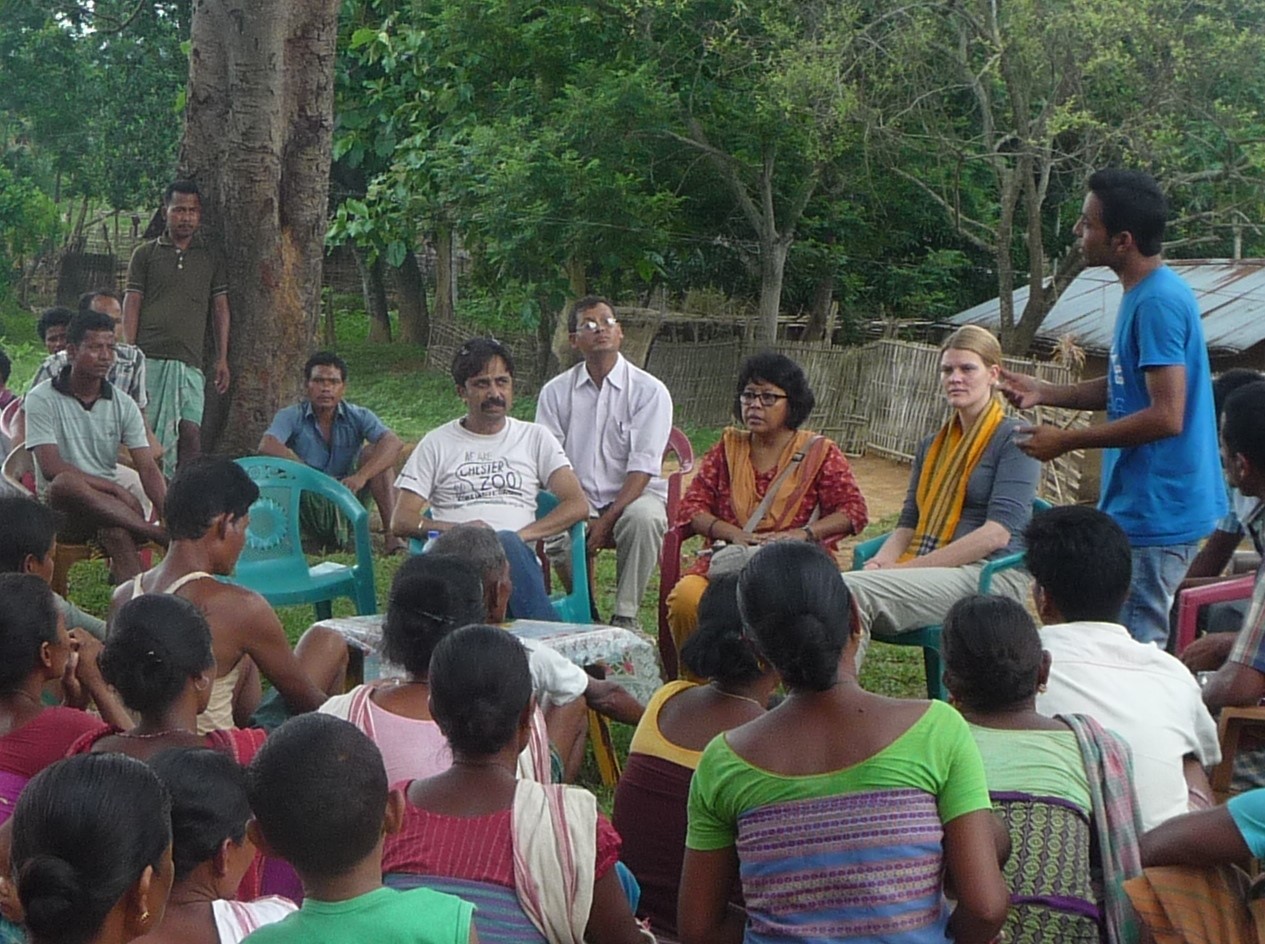Dr Alexandra Zimmermann
Research Fellows
Senior Research Fellow
I specialize in human-wildlife conflict, in particular conflict analysis, mediation, policy and training. My applied work concentrates mostly on community engagement and stakeholder dialogue, while my research focusses on quantitative and qualitative social research on livelihoods and the socio-cultural aspects of living near wildlife. I also work on policy and capacity building for conservation conflict mediation, particularly at national and intergovernmental levels.
I am Chair of the IUCN SSC Human-Wildlife Conflict Task Force and Senior Advisor on Human-Wildlife Conflict at the Global Wildlife Program of the World Bank. I’m a Member of the IUCN Commission on Environmental, Economic and Social Policy (CEESP), the IUCN SSC Asian Elephant Specialist Group, the Cat Specialist Group, IUCN SOS Technical Advisory Board, and the Conservation Advisory Board of Elephant Family. I was previously with Chester Zoo for 18 years, most recently as of Head of Conservation Science, focussing on research & development, strategic partnerships and monitoring and evaluation.
Based at WildCRU, I lead a partnership between Chester Zoo and WildCRU which comprises an interdisciplinary team of doctoral and postdoctoral researchers studying a range of human-wildlife interactions around the globe. My work on human-wildlife conflict has included jaguars and pumas in Brazil and Venezuela, elephants in India and Indonesia, tigers in Nepal, bears in Bolivia, and fruit bats in Mauritius. I also designed and led five Darwin Initiative grants on human-wildlife conflict in India, Indonesia, Nepal and Bolivia.
I studied Zoology at Leeds University (BSc, 1997), Conservation Biology at the Durrell Institute for Conservation and Ecology (MSc, 2000), carried out my doctorate in WildCRU, Oxford University (DPhil, 2014), and trained in nonprofit strategic management at Harvard Business School (2015), conflict negotiation at Harvard Law School (2017) and diplomatic neogtiation at the United Nations (UNITAR, 2019).
Websites
IUCN SSC Human-Wildlife Conflict Task Force
Human-Wildlife Conflict Resource Library
Selected Publications
Marchini, S., Ferraz, K., Zimmermann, A., Guimarães-Luiz, T., Morato, R., Correa, P. & Macdonald. D.W. (in press). Planning for coexistence in a complex human-dominated world. In: Frank, B., Glikman, JA & Marchini, S. Human-Wildlife Interactions: Turning Conflicts Into Coexistence? Cambridge University Press
Vucetich, J.A., Burnham, D., Macdonald, E.A., Bruskotter, J.T., Marchini, S., Zimmermann, A., Macdonald, D.W. (2018). Just conservation: what is it and should we pursue it? Biological Conservation, 221, 23-33
S. Pooley, M. Barua, W. Beinart, A. Dickman, G. Holmes, J. Lorimer, A.J. Loveridge, D.W. Macdonald, G. Marvin, S. Redpath, C. Sillero-Zubiri, A. Zimmermann, & E.J. Milner-Gulland (2017) An interdisciplinary review of current and future approaches to improving human–predator relations. Conservation Biology, DOI: 10.1111/cobi.12859
Zimmermann, A., (2014). Jaguars and people: a range‐wide analysis of human‐wildlife conflict. D.Phil. Thesis. Wildlife Conservation Research Unit. University of Oxford
Wilson, S., Davies, T.E., Hazarika, N. & Zimmermann, A. (2013) Understanding Patterns of Human-Elephant Conflict in Assam: An Analysis to Inform Mitigation Strategies. Oryx.
Chartier, L., Zimmermann, A. & Ladle, R.J. (2011). Habitat loss and human–elephant conflict in Assam, India: does a critical threshold exist?. Oryx. 45 (04): 528-533.
Davies, T. E., Wilson, S., Hazarika, N., Chakrabarty, J., Das, D., Hodgson, D. J. & Zimmermann, A. (2011), Effectiveness of intervention methods against crop-raiding elephants. Conservation Letters. 4: 346-354
Zimmermann, A., Baker, N., Inskip, C. Linnell, J.D.C., Marchini, S., Odden J., Rasmussen G. & Treves, A. (2010) Contemporary views of human-carnivore conflicts on wild rangelands. In: Wild Rangelands: Conserving Wildlife While Maintaining Livestock in Semi-Arid Ecosystems. Editors: J. du Toit, R. Kock & J.C. Deutsch. Wiley-Blackwell, UK. 129-151.
Cavalcanti, S., Marchini, S., Zimmermann, A. , Gese, E.M. & Macdonald, D.W. (2010). Jaguars, livestock and people in Brazil: reality and perceptions behind the conflict. Biology and Conservation of Wild Felids. Eds D.W. Macdonald & A.J. Loveridge. Oxford University Press. Oxford UK. 383-402
Davies, T.E., Hazarika, N., Wilson, S. & Zimmermann, A. (2010). Living with elephants in Assam. Lifelines. BIAZA. British and Irish Association of Zoos and Aquariums. 14-15.
Zimmermann, A. (2010). The role of zoos in contributing to in situ conservation. In: Wild Mammals in Captivity. D. Kleiman. et al. (Ed). Chicago University Press, Chicago. USA.
Inskip, C. & Zimmermann, A. (2009). Human-Felid Conflict: A Review of Patterns & Priorities Worldwide. Oryx 43 (1): 1-17.
Zimmermann, A., Davies, T.E., Hazarika, N., Wilson, S., Chakrabarty, J., Hazarika, B. & Das, JC. (2009). Community-based human-elephant conflict management in Assam. Gajah. IUCN SSC Asian Elephant Specialist Group. 30: 34-40.
Wilson, S., A. Zimmermann, N. Hazarika, J. Chakrabarty, D.J. Das, et al (2008). Living with Elephants in Assam. EcoSystems-India and North of England Zoological Society. Guwahati, Assam, India.
Zimmermann, A., Hatchwell,M., Dickie,L. & West, C. (2007) Zoos in the 21st Century: Catalysts for Conservation? Cambridge University Press, Cambridge UK.
Zimmermann, A. & Wilkinson, R. (2007). The conservation mission in the wild: Zoos as conservation NGOs. In: Zoos in the 21st Century: Catalysts for Conservation? Ed. A. Zimmermann et al. Cambridge University Press, Cambridge UK. pp. 303-321
Leader-Williams, N., Balmford, A., Linke, M., Mace, G., Smith, R.J., Stevenson, M. Walter, O., West, Cd., & Zimmermann. (2007). Beyond the ark: Conservation biologists’ views of the achievements of zoos in conservation. In: Zoos in the 21st Century: Catalysts for Conservation? Ed. A. Zimmermann et al. Cambridge University Press, Cambridge UK. pp.236-256.
Mace, G., Balmford, A., Leader-Williams, N., Manica, A., Walter, O., West, C., & Zimmermann, A. (2007) Measuring zoos’ contributions to conservation: A proposal and trial. In: Zoos in the 21st Century: Catalysts for Conservation? Ed. A. Zimmermann et al. Cambridge University Press, pp. 322-342
Balmford, A., Leader-Williams, N., Mace, G., Manica, A., Walter, O., West, C., & Zimmermann, A. (2007) Message received? Quantifying the conservation education impact of UK zoos. In: Zoos in the 21st Century: Catalysts for Conservation? Ed. A. Zimmermann et al. Cambridge University Press, pp. 120-138.
Zimmermann, A., Walpole, M. J., & Leader-Williams, N. (2005) Cattle ranchers’ attitudes to conflicts with jaguars in the Pantanal of Brazil. Oryx. 39 (4): 406-412.
Zimmermann, A. (2000). Jaguar-Rancher Conflict in the North Pantanal of Brazil. MSc Thesis. Durrell Institute of Conservation and Ecology, University of Kent, UK.
Zimmermann, A. (1997). Status Analysis of Ex-Situ Conservation of Primates. B.Sc.Diss. University of Leeds.
Zimmermann, A. (1996). Effects of Feeding Enrichment on Behaviour in Ruffed Lemurs. B.Sc.(Hons) Dissertation. University of Leeds.







